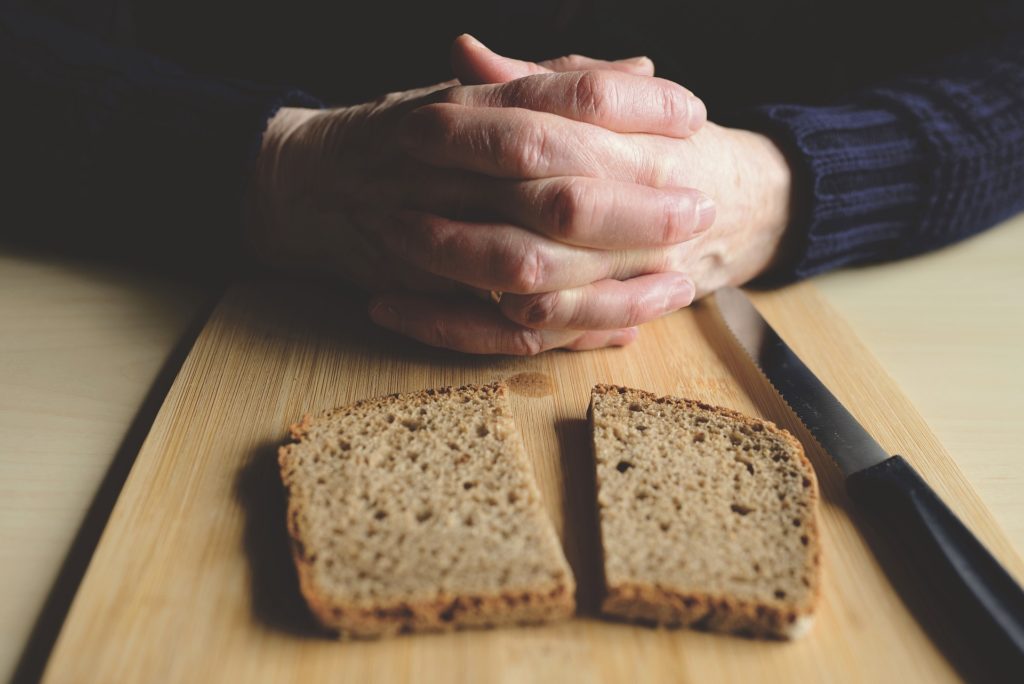Is this the kind of fast I have chosen,
Isaiah 58:5-9 NIV
only a day for people to humble themselves?
Is it only for bowing one’s head like a reed
and for lying in sackcloth and ashes?
Is that what you call a fast,
a day acceptable to the Lord?
“Is not this the kind of fasting I have chosen:
to loose the chains of injustice
and untie the cords of the yoke,
to set the oppressed free
and break every yoke?
Is it not to share your food with the hungry
and to provide the poor wanderer with shelter—
when you see the naked, to clothe them,
and not to turn away from your own flesh and blood?
Then your light will break forth like the dawn,
and your healing will quickly appear;
then your righteousness will go before you,
and the glory of the Lord will be your rear guard.
Then you will call, and the Lord will answer;
you will cry for help, and he will say: Here am I.
What is fasting?
Fasting during Lent is a religious practice observed by many Christians, particularly those in the Catholic, Orthodox, and Anglican traditions. Fasting typically involves abstaining from certain foods or types of food or limiting the amount of food eaten during certain times of the day. Many traditions fast from meat on Fridays as well. Others choose to fast from treats, desserts, chocolate, or alcohol. Still, others fast from social media or other forms of distraction.
Why fast?
We fast to draw closer to God through self-denial and discipline. It is a way to focus on spiritual matters rather than material concerns. Many Christians also use the practice of fasting as an opportunity for prayer and reflection to deepen their relationship with God and their understanding of themselves.
Is fasting required?
The Bible does not command Christians to fast. In what we call the “Sermon on the Mount,” Jesus refers to fasting as if it is a normal practice among His followers, much like prayer. He says, “Whenever you fast … ” as if surely it will happen.
Initially, the law only required the Israelites to fast on the Day of Atonement. In the Old Testament, some fasted to seek blessings from God and to mourn. But most often, we see examples of fasting in repentance and sorrow.

In the New Testament, Jesus teaches that some spiritual battles are only won through prayer and fasting (Mark 9:29). Luke tells us in Acts that elders were appointed after prayer and fasting (Acts 14:23). And of course, Jesus fasted to prepare for ministry (Matthew 4:1-17).
Notice what God says through Isaiah …
There are dangers in fasting – it can become legalistic, and we can do it out of wrong motives – to somehow try to obligate God to bless us. We can fast and ignore the very heart of God, which is taking care of one another. Isaiah 59:5-9 mirrors Jesus’ warning in Matthew 25:31 – 46.
A frequently reoccurring theme in scripture is how God expresses concern for the underprivileged, outcasts, and the marginalized. While it may be uncomfortable for those of us who aren’t impoverished or oppressed, God’s focus reveals His character. God’s character is explicitly apparent in His love for widows and orphans.
But it is not just God’s love for His creatures that compels us to take care of those who are disenfranchised. Our communities flourish when we attend to the needs of the weakest members. We sometimes say, “No chain is stronger than its weakest link.” I believe God emphasizes that society, especially His church, is only as strong as its most vulnerable members.
If you really change your ways and your actions and deal with each other justly, if you do not oppress the foreigner, the fatherless or the widow and do not shed innocent blood in this place, and if you do not follow other gods to your own harm, then I will let you live in this place, in the land I gave your ancestors for ever and ever.
Jeremiah 7:5-7 NIV
There is more. It’s not just that the community will flourish when we care for the weakest among us. God promised the land to His people, but that promise wasn’t just about dirt – it was about inviting His blessing on the community and His being their God. We invite God into our midst when we care for one another – and especially care for the impoverished and defenseless.
Back to Fasting
Will you fast a meal today? Fast a preferred activity? If you are interested in an unusual take on fasting, read 40 Days of Decrease: A Different Kind of Hunger. A Different Kind of Fast by A. B. Chole. For example, on Saturday, the 4th day of Lent, the author recommended fasting from artificial light for a day. She suggested reading Hebrews 11 by candlelight. Fasting can take many forms. If you fast, how will you draw close to God? Whose needs might you meet today?
Prayer
Father, You who created us, who gave us appetite,
Would You move us to worship You well –
To humble ourselves, even to deny ourselves
So that we might draw close to You.
And in drawing close, may we represent You well –
Ministering to the oppressed, the foreigner, the lonely,
The widows and orphans, the disenfranchised, the unlovely-
May we see those different from us through Your eyes,
May we see the potential You see, and would we be Your
Hands and feet, clothing the naked, extending hospitality,
Binding the wounds of the hurting and inviting all to drink
Deeply from the water of life!
God, to You, be all the glory, in Christ Jesus
Throughout all generations. Amen.